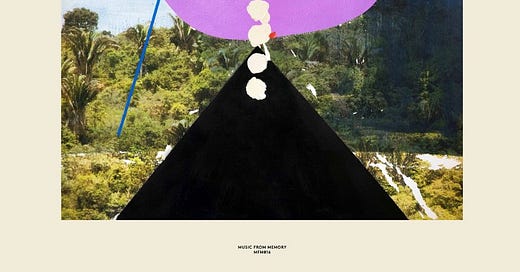Compilation Offers a Glimpse of a Thriving Creative Ecosystem….

VARIOUS ARTISTS: Outro Tempo: Electronic and Contemporary Music From Brazil 1978–1992
For some people (and certainly some cratediggers), the stereotypes surrounding Brazil and its music are nearly impossible to shake. The vast and verdant land of 200 million will always be the home of samba and those alluring beachcombers immortalized in bossa nova hits. It’s always sunny there. The singing is always sultry there. The lushness of the physical place, with its mountains and rainforests, is woven, forever, into the music.
This is, of course, a limiting, tourist’s view of Brazilian music — one that generations of musicians have worked to dispel. Some of them turn up on Outro Tempo, a 2-disc anthology from the UK-based Music From Memory label. It’s a portal into an alternate audio realm, with its own history. And while it features some artists with deep ties to tradition — including Maria Rita, the daughter of the vocal legend Elis Regina — it mostly spotlights those whose work falls on the electronic or experimental side of the samba matrix.
That’s right, in the decades following the worldwide bossa explosion there were actually some musicians who busied themselves with things other than “The Girl From Ipanema.” In a place as big as Brazil, traditionalists and insurrectionists could coexist, and actually learn from each other — one hallmark of Brazilian popular culture is that ideologically distinct creative ecosystems frequently overlap and mingle. . Many of these artists came up during the late ’60s and early ’70s heyday of Musica Popular Brazil (MPB), and were inspired by composers like Egberto Gismonti, who went from writing pop hits to creating gorgeous, impossible-to-categorize instrumental music. This was a rich moment — concurrent with the rise of funk-based R&B in the U.S. and the explosion in drum machines and synthesizers around the world. In Brazil as elsewhere, some notable talents (Sergio Mendes, Raul Seixas) snagged the new tools as a way to “modernize” their music. Outro Tempo focuses on those who sought out significantly stranger vistas instead.
For example: If it’s been awhile since you’ve listened at any length to an oboe, cue up Priscilla Ermel’s transfixing “Gestos De Equilibrio.” It’s strange and ceremonial from the start, and as it develops, offers a beautiful conversation between oboe and droning synths, then another between ruminating electric piano and acoustic guitar. The nearest genre description would be “New Age” but that doesn’t get close to its understated grace.
That’s the key: Even when the settings are more “experimental,” the artists do not cease to be Brazilian — they don’t suppress the surging, heart-swelling melodic beauty that is a hallmark of the country’s music. Even the solemn entreaties to various deities or orishas — like Maria Rita’s “Cantico Brazileiro №3” — arrive bearing alternately rousing and insinuating hooks. And to hear how a often-used and almost generic tribal pulse can anchor a series of fanciful, improvised flights, check Ermel’s 15-minute “Corpo do Vento,” which slyly makes the case, long known to Brazilians, that if the rhythm is entrancing, the rest of the music can literally go anywhere.
Further Exploration: Maria Rita: Samba Meu (2007); Egberto Gismonti: No Caipira (1978); Suba: Tributo (2002).



